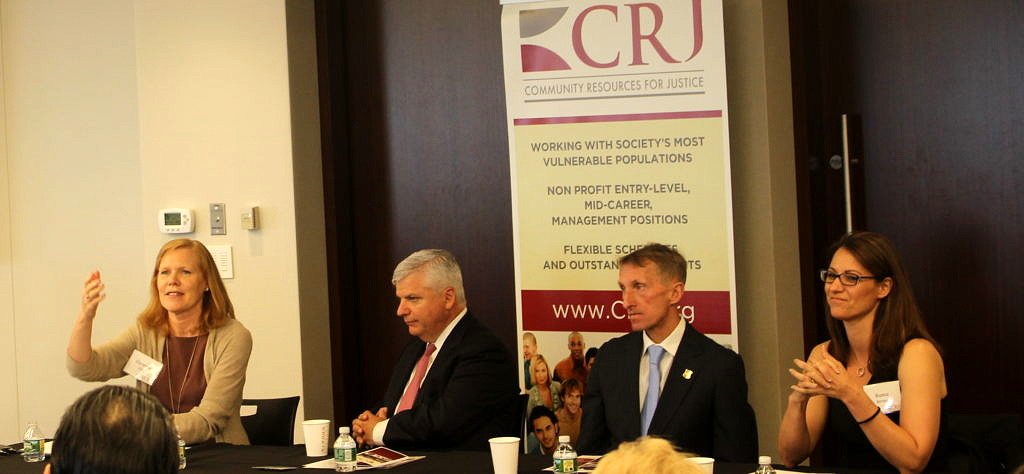
When Boston Police Commissioner William Evans joined the department in the early 1980s, the measure of a good cop was how many people an officer locked up in a year.
Since then, the department, like others around the country, has shifted focus, ditching quotas, hiring social workers, and doing community outreach to build trust as a means to make policing more efficient and fair, Evans said Tuesday, May 23, during a panel discussion organized by Community Resources for Justice.
“All I care about is that my officers are out there treating people fairly,” he said. “We’re not all about numbers anymore and getting these kids into the criminal justice system. It’s about getting them jobs. It’s about having eight social workers, like we do, in the stations.”
More than 50 guests attended CRJ’s community conversation, the latest in an occasional series of panel discussions on topics around criminal justice reform, at the offices of Choate, Hall & Stewart in Boston. The panel included Evans, Suffolk County District Attorney Dan Conley, and Dr. Bianca Bersani, an associate professor of sociology at the University of Massachusetts at Boston. Christine Cole, executive director of the Crime and Justice Institute at CRJ, moderated the discussion, which focused on the concept of procedural justice.
“Procedural justice is a somewhat fancy term for the very common sense idea that how we treat people matters,” Bersani said.
For the law enforcement, courts, and probation departments, that means applying rules consistently, making decisions impartially, allowing everyone to have a voice in the process, and being transparent. Studies have shown that when law enforcement and courts make concerted efforts to be open and fair, it increases legitimacy and trust in the criminal justice system even among people being arrested or sentenced, Bersani said.
With more community trust in a police department, people are more likely to report crimes and help officers identify suspects, Bersani added.
Like the police department, Conley said his office has embraced procedural justice and does not track prosecutors’ conviction rates.
“Our job is to achieve justice and to be known for our fundamental fairness and integrity,” he said.
Evans said peace walks in city neighborhoods, having school resource officers assigned to elementary schools, and community events like handing out ice cream to children have all helped build up the police department’s reputation.
Sarah Flint, a founding member of Mothers for Justice and Equality, was in the crowd for Tuesday’s event. Flint, whose teenage son was murdered in Boston, commended the police department and the district attorney’s office for community outreach efforts.
Scott Harshbarger, chairman of CRJ’s board of directors, said Massachusetts is ahead of other states on procedural justice reforms.
“We need to make sure we’re leading the country in achieving reforms that make a huge difference in the quality of people’s lives,” he said. “We need to be tough, and we need to be fair.”